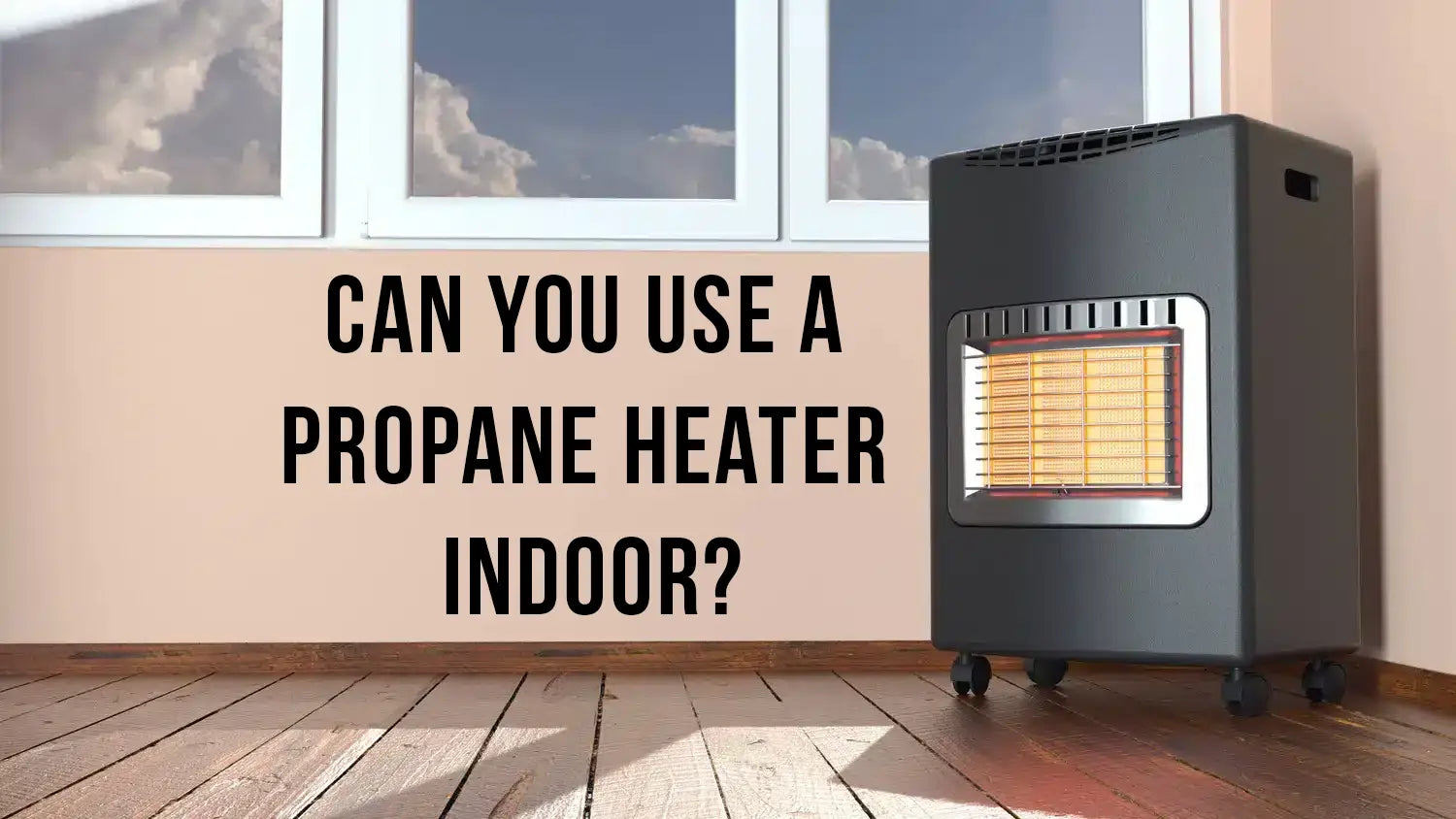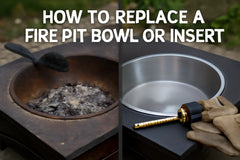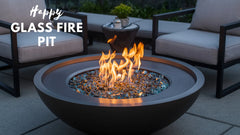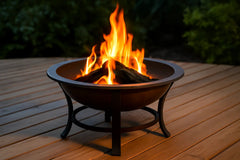Can You Use A Propane Heater Indoor?
A Propane heater is an important way to warm your home during winter and cold months. These heaters are used in areas where central heating systems are not available. However, they raise significant questions about safety, efficiency, and proper use. This article provides a detailed examination of whether propane heaters can be used indoors, how to use them safely, and what precautions are necessary to minimize risk.
Propane Heater

A propane heater is a device that is used to heat or warm the indoors. It uses propane gas as a fuel to generate heat. It keeps your indoors warm and cozy. Propane is a hydrocarbon gas compressed into liquid form and stored on pressurized tasks. These heaters are commonly portable, making them a convenient option for supplemental heating. Propane heaters are available in different sizes, from small personal heaters to larger units designed for heating big spaces like farmhouses or warehouses. Indoor propane heaters are different from outdoor models in their design and safety features. While outdoor propane heaters often lack the safeguard needed for enclosed spaces. Indoor models are specifically made to function safely in areas with limited ventilation. They usually have features like oxygen depletion sensors, ODS, and tip-over shut-off mechanisms to enhance user safety.
Propane Heater’s Safety:
If you want some facility and convenience, you must ensure its safety and security. So, it won’t hurt you or anything indoors. The safety of using a propane heater indoors depends mainly on the type of heater and how it is used. Propane heaters designed for indoor use are generally safe, provided they are operated according to the manufacturer’s instructions. These heaters are equipped with safety features to reduce risks associated with indoor heating, such as carbon monoxide buildup, oxygen depletion, and fire hazards. However, outdoor propane heaters should never be used indoors because they lack the necessary safety features. These heaters can release high levels of carbon monoxide, a colorless and odorless gas that can be lethal in confined spaces. Therefore, it is essential to distinguish between heaters designed for indoor and outdoor.
How Does It Work:
Propane heaters use propane gas to generate heat. It burns the gas and produces heat. When burnt, the gas is combined with oxygen to produce heat energy. The combustion process releases byproducts, including carbon dioxide, water vapor, and, in some cases, a trace amount of carbon monoxide. Indoor propane heaters are designed to manage these byproducts efficiently. They often include features like catalytic combustion, which minimizes harmful emissions, or venting systems that direct gases outside the room. Advanced models also have sensors to monitor air quality and automatically shut off the heater if oxygen levels drop too low or carbon monoxide levels rise.
Safety Issue Of Using Propane Heaters:
Propane heaters are useful and beneficial, but they also have some disadvantages and safety issues. By understanding the risks and issues, you can prevent mishaps and ensure a proper and safe option.
Carbon monoxide is a significant concern when using any fuel-burning appliances indoors. This gas is produced when propane is not burned entirely due to insufficient oxygen. Prolonged exposure to carbon monoxide can cause symptoms like dizziness, headaches, nausea, and, in severe cases, death. Indoor propane heaters with an oxygen depletion sensor can reduce this risk by shutting off the heater if oxygen levels become dangerously low.
Burning propane consumes oxygen, which can lead to a decrease in oxygen levels in poorly ventilated spaces. Oxygen depletion can cause shortness of breath, confusion, and fatigue. This is why it is important to use propane heaters in well-ventilated areas and avoid running them for an extended period in tightly sealed rooms.
Propane heaters pose a fire risk if they are placed near flammable materials or if they tip over. Many modern indoor propane heaters include safety features like a tip-over shut-off switch to prevent accidents, but users must still exercise caution when positioning the heater.
Propane heaters can produce high heat levels, which may lead to overheating if the device is too large for the room or misused. Overheating can damage nearby objects or cause burns if someone accidentally touches the heater.
How To Use It Safely:
These are some ways to use propane heaters indoors. You have to follow some guidelines to ensure the safety:
Select a propane heater specifically designed for indoor use. Check for features like an oxygen depletion sensor, a tip-over shut-off mechanism, and low emissions. Read the manufacturer’s specifications to ensure the heater is suitable for the room's size. Always use a propane heater in a well-ventilated area. Even indoor models designed to minimize emissions require some level of ventilation to ensure that fresh air circulates and harmful gases are removed.
Open a window slightly or use the heater in a room with natural airflow. Consider using a carbon monoxide detector in the room where the heater is used. This device will alert you if carbon monoxide levels become unsafe, giving you time to act and prevent harm. Place the heater on a flat, stable surface away from flammable objects like curtains, furniture, and paper. Keep it at least three feet away from walls and other items to reduce fire risk. Read and adhere to the operating instructions provided by the manufacturer.
These instructions will outline the specific requirements for your heater, including recommended room sizes, ventilation needs, and maintenance tips. Inspect the heater regularly for signs of wear or damage. Clean it according to the manufacturer’s guidelines to ensure it operates efficiently and safely. Replace any worn or damaged parts promptly. Avoid leaving a propane heater running unattended, especially overnight. Turn off the heater when you leave the room or sleep to prevent accidents.
When To Avoid Using Propane Heater Indoor:
Generally, propane heaters are safe indoors if guidelines and safety measures are followed. But there are certain situations when you have to stop using propane heaters indoors:
- When the room is not ventilated or sealed tightly.
- You do not have a carbon monoxide monitor.
- The heater shows signs of damage or malfunction
- There are young children or pets who might accidentally touch or tip over the heater.
- The room contains flammable materials or substances.
Benefits:
Propane heaters have a lot of benefits and advantages that make them an ideal choice for indoor heating:
- Most propane heaters are lightweight and easy to move, which allows you to heat specific areas as needed.
- Propane heaters provide rapid and effective heat, often cheaper than electric heaters.
- These heaters can operate during power outages, which makes them a reliable backup heating source.
- Propane heaters are available in different sizes and styles, allowing you to choose a model that suits your needs.
Conclusion:
A propane heater indoors can be safe and effective, provided you take the necessary precautions and choose the right equipment. Always select a heater designed for indoor use, ensure proper ventilation, and monitor air quality to reduce carbon monoxide and oxygen depletion risks. By following these guidelines, you can enjoy the warmth and comfort of a propane heater while prioritizing safety.






